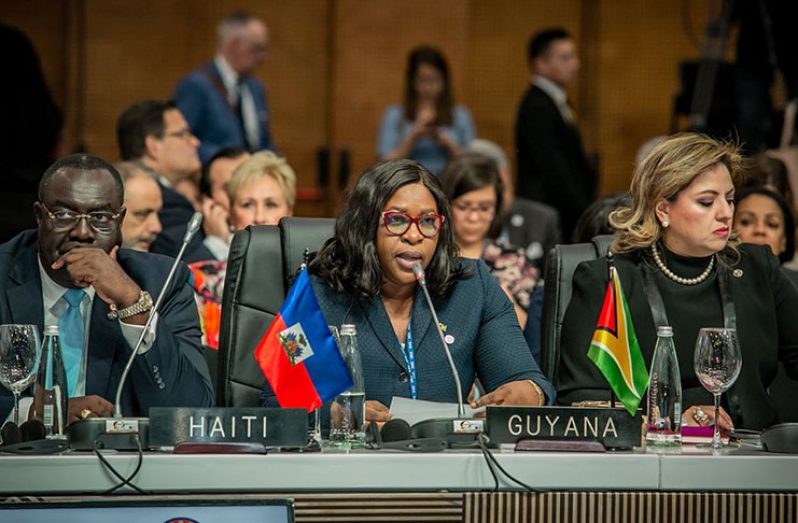…urges greater collaboration on climate change
AS the regional crisis created by Venezuela’s collapsing economy took centre stage at the Organisation of American States (OAS) General Assembly last week, Guyana’s Minister of Foreign Affairs, Dr. Karen Cummings, highlighted the impact the crisis has on Guyana, while also stressing the need for continued multilateral cooperation on issues such as climate change.
The General Assembly, which is held annually, saw representatives from the OAS’ 35 member states convening from June 26 – 28 in Medellin, Colombia to discuss and form policies on challenges facing the hemisphere – chief among them being the Venezuela crisis.

Minister Cummings in her address reminded that like many other countries, Guyana, as a continental neighbour to the Spanish speaking state, remains “seriously affected” by the influx of Venezuelan citizens seeking relief from the situation in their homeland, and gave Guyana’s commitment to seeing a solution to the issue. “The Government of Guyana, shares the concerns of OAS member states and of the international community over the continuing political, economic and humanitarian problems in the Bolivarian Republic of Venezuela,” the Minister noted.
“My Government has assisted Venezuelans who have sought refuge in Guyana, through the implementation of systems to monitor their entry and the provision of social and health care services. We are not indifferent to the worsening political and constitutional crises in Venezuela and wish to reiterate Guyana’s disposition to continue participating in efforts to bring about a lasting solution that would be beneficial to the people of Venezuela.”
Over 10 percent of Venezuela’s population or some four million people are said to have fled the country over the past few years, fleeing hyperinflation, unemployment, violence and shortages in food and medication. The UN projects the number to reach as much as five million by the end of this year. Millions have fled to Colombia, Chile, Peru, Ecuador, while thousands still are taking refuge in Guyana and Trinidad and Tobago. Minister Cummings noted that while the number of migrants in Guyana may be comparatively small, the impact on the country is relatively significant. “I ask you to consider the phenomenon not in absolute terms but in relative ones, to count not the numbers of migrants and refugees but to measure the impact, especially on a small country such as ours, with limited resources and facilities to provide the assistance required,” Cummings pointed out.
A recent survey by the United States Agency for International Development (USAID) of 1100 Venezuelan migrants in Guyana indicates that 17 per cent of that population, which is school-aged, is attending school here. It is estimated although the figures may have since risen, as of February this year, Guyana hosted approximately 36,400 Venezuelan migrants.
Although USAID did not differentiate how many persons have stayed permanently and how many came as a means of moving on to another country, the figures are likely to be higher since boatloads of Venezuelans have been coming here this year.
USAID posted on its website its second fact sheet for the year regarding Washington’s response to the issue and the data illustrated the broad efforts of the agency to the blooming migration issue; the agency reported that regional nations continue to adapt to the influx of Venezuelan migrants.
According to USAID, this country’s public healthcare system has been “strained” by the influx of the migrants and this report was attributed to United States Department of State officials who travelled to the western border region of Guyana in late March this year.
With US$550,000 in funding this year, the US will support UN partners in Guyana through activities providing multi-sector assistance to vulnerable Venezuelans, including activities to combat gender-based violence, the report said.
Guyana has been making moves to accommodate the children of re-migrants into the school system here.
Over the past several weeks, an advertisement was published on multiple occasions in the Guyana Chronicle in which the Ministry of Education has made note of an examination which will be conducted on July 25, 2019 for re-migrants, private and public school candidates. USAID said that its partners are working with the Government of Guyana to address education needs among Venezuelans, including launching a safe-school initiative to increase service delivery in host communities.
Guyana reservations

Meanwhile, Dr Cummings established Guyana’s reservations over the appointment of Julio Borges, who was appointed by Venezuela’s opposition leader Juan Guaido, as Venezuela’s permanent representative to the OAS. In April, the OAS permanent council approved the Guiado delegation. Last Friday 20 of the 35 member states voted to recognise Borges. “That process was flawed. This General Assembly needs to arrive at a more acceptable solution, within the parameters of our Charter and Rules of Procedure,” Cummings posited.
Early in her speech the Minister noted that: “We are all governed by the same rules and we must all abide by them. The end, no matter how noble, can never justify the means, if these fall short of the highest standards of probity and legality.”
She called for the strengthening of the body’s institutional framework, referencing the draft Resolution of the Institutional Strengthening Proposal for the OAS which was deliberated upon at the General Assembly. “Much more work remains to be done in this area but let us not lose sight of the fact that much good work has been done, with valuable contributions by all Member States, and a very worthwhile process is under way, on which the General Committee of the Permanent Council is charged with taking forward, especially in light of some of the proposals for reform of which we have been hearing,” she noted.
The OAS was established in 1948 with the signing in Bogotá, Colombia, of the Charter of the OAS, which entered into force in December 1951. Guyana became a member in 1991. The Organisation was established in order to achieve among its member states “an order of peace and justice, to promote their solidarity, to strengthen their collaboration, and to defend their sovereignty, their territorial integrity, and their independence.”



.jpg)









